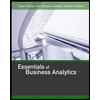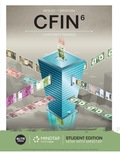Consider the rate of return of stocks ABC and XYZ. Year rABC rXYZ 1 20 % 28 % 2 8 11 3 16 19 4 4 1 5 2 −9 a. Calculate the arithmetic average return on these stocks over the sample period. b. Which stock has greater dispersion around the mean return? A. ABC B. XYZ c. Calculate the geometric average returns of each stock. What do you conclude? (Do not round intermediate calculations. Round your answers to 2 decimal places.) d. If you were equally likely to earn a return of 20%, 8%, 16%, 4%, or 2%, in each year (these are the five annual returns for stock ABC), what would be your expected rate of return? (Do not round intermediate calculations.) e. What if the five possible outcomes were those of stock XYZ? f. Given your answers to (d) and (e), which measure of average return, arithmetic or geometric, appears more useful for predicting future performance? A. Arithmetic B. Geometric
Risk and return
Before understanding the concept of Risk and Return in Financial Management, understanding the two-concept Risk and return individually is necessary.
Capital Asset Pricing Model
Capital asset pricing model, also known as CAPM, shows the relationship between the expected return of the investment and the market at risk. This concept is basically used particularly in the case of stocks or shares. It is also used across finance for pricing assets that have higher risk identity and for evaluating the expected returns for the assets given the risk of those assets and also the cost of capital.
Consider the
| Year | rABC | rXYZ | ||
| 1 | 20 | % | 28 | % |
| 2 | 8 | 11 | ||
| 3 | 16 | 19 | ||
| 4 | 4 | 1 | ||
| 5 | 2 | −9 | ||
a. Calculate the arithmetic average return on these stocks over the sample period.
b. Which stock has greater dispersion around the mean return?
A. ABC
c. Calculate the geometric average returns of each stock. What do you conclude? (Do not round intermediate calculations. Round your answers to 2 decimal places.)
d. If you were equally likely to earn a return of 20%, 8%, 16%, 4%, or 2%, in each year (these are the five annual returns for stock ABC), what would be your expected rate of return? (Do not round intermediate calculations.)
e. What if the five possible outcomes were those of stock XYZ?
f. Given your answers to (d) and (e), which measure of average return, arithmetic or geometric, appears more useful for predicting future performance?
A. Arithmetic
Trending now
This is a popular solution!
Step by step
Solved in 2 steps with 3 images









